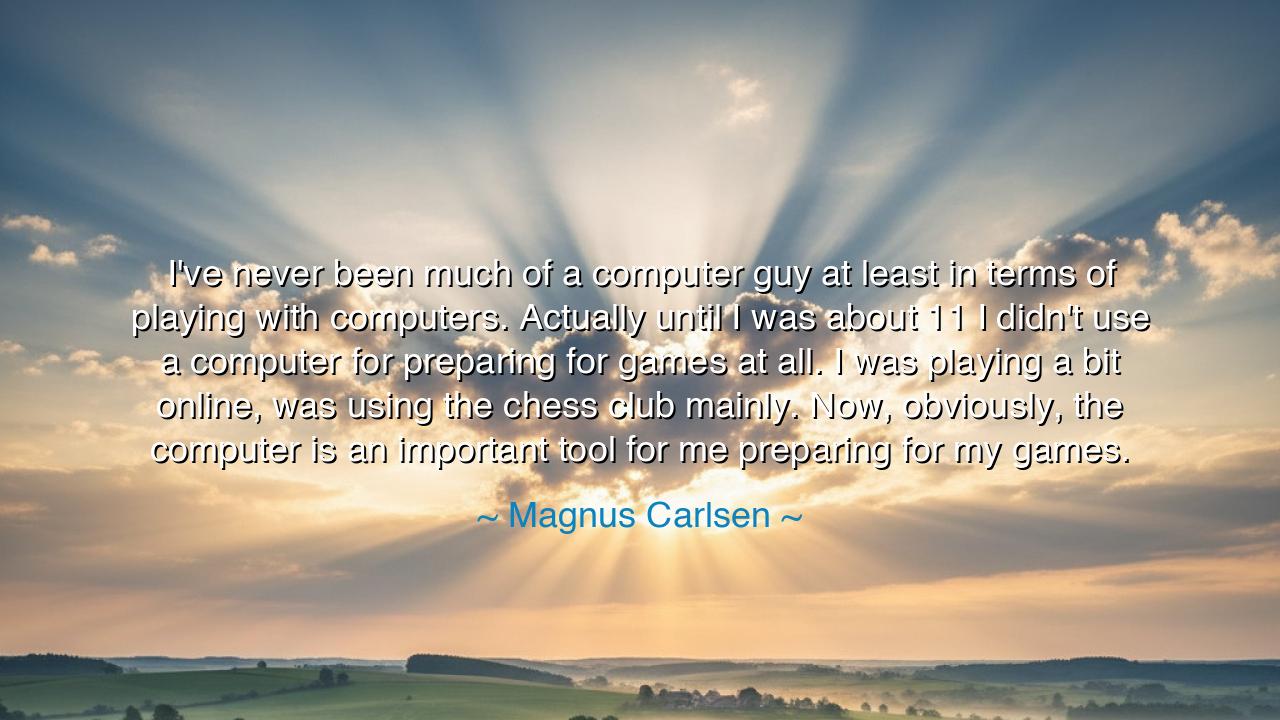
I've never been much of a computer guy at least in terms of
I've never been much of a computer guy at least in terms of playing with computers. Actually until I was about 11 I didn't use a computer for preparing for games at all. I was playing a bit online, was using the chess club mainly. Now, obviously, the computer is an important tool for me preparing for my games.






"I've never been much of a computer guy, at least in terms of playing with computers. Actually, until I was about 11, I didn't use a computer for preparing for games at all. I was playing a bit online, was using the chess club mainly. Now, obviously, the computer is an important tool for me preparing for my games." These words, spoken by the great Magnus Carlsen, the reigning World Chess Champion, echo a profound truth about adaptation and the evolving role of technology in the lives of even the most skilled human minds. His words remind us that progress, in all its forms, does not arrive in a straight line, nor does it define the essence of a person’s success.
In ancient times, before the vastness of knowledge could be captured in the flickering glow of screens, great minds relied on books, scrolls, and the silent wisdom of the stars. Think of the great philosophers of Greece, who pondered the nature of existence under the open sky, or the mathematicians of Babylon who charted the heavens using only the naked eye and simple tools. Yet, as time flowed like a river from one generation to the next, tools were created that allowed humanity to see further, reach higher, and understand deeper. The tools of their time became instruments of mastery.
Magnus Carlsen, a modern-day genius of strategy and intellect, draws an unexpected line between his own development and the historical path of human ingenuity. He, like the ancients, faced the challenge of mastering his craft. But unlike the philosophers who gazed at the stars or the warriors who honed their skill with sword and shield, Carlsen's challenge was to see through the infinite complexity of chess—a game that has confounded even the greatest minds for centuries. Yet, until the age of 11, his tools were those of tradition: the chess club, the physical board, and perhaps most important of all, his mind. This, too, is a lesson in humility and wisdom.
Therein lies the crux of Carlsen's reflection. He acknowledges that his path to greatness was rooted in something far older than computers. His reliance on the traditional aspects of the game—the tactile nature of the board, the human interaction at the chess club—mirrors the wisdom of the ancients who, though unacquainted with modern machines, relied on the strength of their intellect and their capacity for deep, focused thought. The human mind, after all, remains the greatest tool of all, and it is through this tool that the greatest achievements are realized.
But Carlsen’s words also reflect the evolution of human adaptation. While the chess prodigy began with no computers, he later embraced them fully, recognizing that the modern world has made the computer an essential tool for preparation. In the world of chess, where each game is a battle of infinite possibilities, computers allow Carlsen to sift through vast databases of games, analyze countless positions, and gain insights that were once beyond the reach of the human mind. The tool becomes an extension of the self, allowing the individual to transcend their natural limits and reach new heights.
The story of Carlsen’s journey from the traditional chess club to the digital age reflects a universal truth: the tools we wield are not what define us, but how we choose to use them. Technology, in its many forms, is merely a reflection of our own capability and vision. What is truly important is the mind—the ability to adapt, to learn, to innovate. The chessboard, whether made of wood or pixels, is still just a stage for the human mind to work its magic.
The lesson is clear: embrace change, but never forget that it is the human spirit that drives the evolution of our tools. Whether it is a sword or a computer, the essence of mastery lies in the mind behind the tool. Just as Carlsen began with the simple chess pieces on a wooden board, so too must we begin with the core of our passion, our intellect, and our drive to grow. The tools we use—whether digital or physical—are merely the means to our greater ends.
So, as you journey through your own life, let Carlsen’s words be a reminder: the mind is your most powerful weapon. Tools, no matter how advanced, only serve to magnify your own potential. When you wield the tools of the modern age—be it a computer, a camera, or a pen—know that they are but extensions of your will and intellect. Use them to prepare, to explore, to create, but always remember that the most important preparation happens within: in the growth of the mind, in the honing of the spirit, and in the pursuit of excellence.






AAdministratorAdministrator
Welcome, honored guests. Please leave a comment, we will respond soon